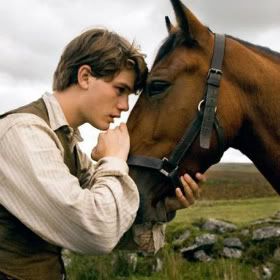 I’m exhausted. I just spent the last 2 ½ hours getting raked over the emotional coals and I am officially wrecked. I surrendered to the master and now I am a pile of goo, desperately needing a dose of comic or cynical relief.
I’m exhausted. I just spent the last 2 ½ hours getting raked over the emotional coals and I am officially wrecked. I surrendered to the master and now I am a pile of goo, desperately needing a dose of comic or cynical relief.
Spielberg has struck again.
Every director has his sweet spot. Steven Spielberg has two: war movies and sentimental heart-tuggers. Truly, nobody can deliver either the way he can. So, when you combine them in the same film, look out. War Horse could just be the ultimate Steven Spielberg movie. And that’s saying a lot.
I don’t know how you couldn’t expect what you get with War Horse. Even if you don’t know the story, it’s all there in the title. War Horse is about a horse sold out from under his loving boy’s care to the cavalry in England at the beginning of World War I. The horse changes hands several times, each time having a unique impact on all who come across it, for it is a truly special horse—stronger and smarter than any other. He endures all the horrors of war, while his loving and determined owner joins the army so he can reunite with him on the battlefield.
Yes, War Horse is exactly what that sounds like: a manipulative, emotional, sentimental, heart-tugging, sweeping epic that will melt the coldest of hearts. There’s no way to not get caught up in some part of this movie because it pushes every possible button. And yet I still found my way to moments of total annoyance at how blatant the schmaltz actually gets. Are they really closing the movie with a soldier returning from war in silhouette against a sweeping orange sky? I kept asking myself how I could be falling for such obvious melodrama. As I wiped giant tears from my eyes, I realized why. Because it works.
And that’s the thing about War Horse. It is unashamed, unabashed, old-fashioned, sentimental movie-making and it really can’t be done any better than this. Cinematographer Janusz Kaminski, Spielberg’s longtime collaborator, is at his best here, painting the canvas with grand scope and magnificent vistas. Composer John Williams is the master manipulator of them all, as his sweeping score sets the tone for Spielberg’s emotional puppetry. As for the screenplay (by Lee Hall and Richard Curtis), every character and storyline is easily recognized, there are no surprises here, but that familiarity is what makes it all work. Spielberg wants us to experience War Horse with our hearts, not our minds.
It’s a fine line between sentiment and schmaltz, and War Horse walks it for 2 ½ hours. In the end, War Horse is a little too Disney for me, but there may be just enough Spielberg to make it worth your while.
